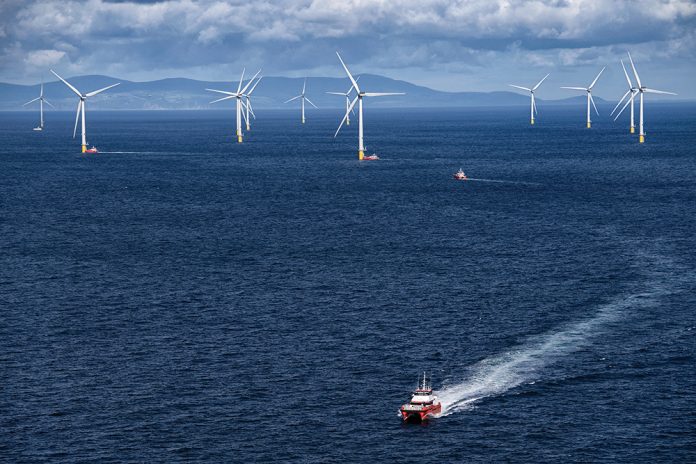Combatting climate change is at the top of the public agenda, with concern at a record high. Last year’s UN report shows that to limit global climate change, we must lower temperature rises to 1.5ºC by 2030. To achieve this, the latest Committee on Climate Change (CCC) report states that the UK must act swiftly. Roughly two thirds of carbon reduction will come from electricity, transport and heating – so businesses play a vital role by taking determined, strategic action in these areas.
100% renewable electricity has been available for several years, so Corporate Power Purchase Agreements (Corporate PPAs) can provide the next step, guaranteeing electricity sourced from a specific renewable generation asset. Northumbrian Water recently agreed a 10-year Corporate PPA with Ørsted – the first of its kind in the UK. We caught up with Alana Kühne, Head of Corporate PPAs at Ørsted, to learn more.
What exactly is a Corporate PPA?
It’s a long-term, fixed price agreement, linked to specific renewable generation assets. The length of term can vary, but between 10 to 15 years is most common. Typically, it’s a direct agreement with a fixed price structure for the full contract. This reduces price risk for the proportion of electricity purchased through the Corporate PPA, by removing exposure to future price volatility.
By taking renewable volume from a specific renewable asset, you support the development of new renewable generation, helping to create a net zero carbon nation. Renewable Electricity Guarantee of Origin certificates (REGOS) enable you to report zero carbon emissions for that electricity.
Other Power Purchase Agreements exist, such as export PPAs, particularly within the water sector where many organisations have hydro or solar assets on-site. Export PPAs create revenue, helping you sell some on-site generation to the market. Corporate PPAs are the opposite way around – you buy renewable generation from a specific, traceable source, fulfilling a proportion of your electricity usage. Because it’s a long-term arrangement, we recommend attributing just a proportion of overall volume to the Corporate PPA, in case future consumption levels change. Northumbrian Water chose 30% of volume over 10 years, but agreements can be tailored to individual strategies.
Is it more expensive than a normal supply agreement?
No – in fact, Corporate PPAs are a great way to manage long-term price risk, with the price per unit typically fixed throughout the full contract period.
Contracts are agreed with generators, not suppliers. The volume is then ‘sleeved’ to your supplier and into your normal supply agreement. Your bill will show different commodity prices – one for your Corporate PPA volume and one for the remaining volume for your regular supply arrangements. Non-commodity costs are the same as for your normal supply agreement, because unless the generation asset is located on your site, the electricity is always transmitted via the grid network.
What should water companies look out for?
Supporting sustainability, Corporate PPAs provide a next step from 100% renewable supply. Here are some considerations:
1. Preferred type of generation. Different generation assets have differing levels of output and efficiency. Discuss this in depth with generators, to determine performance, profile and how these match your own demand profile. Some organisations – and end customers – prefer one technology over another, so factor this in when considering your options. If a generator is also a supplier, this “one stop shop” saves you time.
2. Volume of consumption. In the UK, businesses of any size can choose a Corporate PPA from existing generation assets. Some new build projects might look for a minimum volume of consumption. This will vary depending on the asset size, so it’s worth assessing the kind of renewable generation that’s best for you.
3. Location. Generation assets can be chosen in specific locations. So Corporate PPAs often appeal to companies looking to support their local community, and the regions where they operate or have a substantial customer base.
4. Contract term. Water companies are stable organisations, so taking a longer term, strategic view makes sense. Generally, we would recommend a contract of least ten years, in order to benefit from long term price stability. However, contracts at Ørsted can begin at four years, bridging the gap between supply agreements and the Corporate PPA.
5. Shaping of power. A standard Corporate PPA will deliver you the “as generated” output from a renewable asset. Many companies today, such as Ørsted, offer trading services to balance and shape the output from the generation asset, to a profile more aligned to your consumption requirements (e.g. daily profile or flat baseload). We recommend exploring this, alongside your search for a Corporate PPA, to get the best all round solution that matches your energy purchasing strategy.
To learn more about Northumbrian Water’s corporate PPA, visit: https://orstedbusiness.co.uk/News/2019/03/Northumbrian-Water-corporate-PPA



